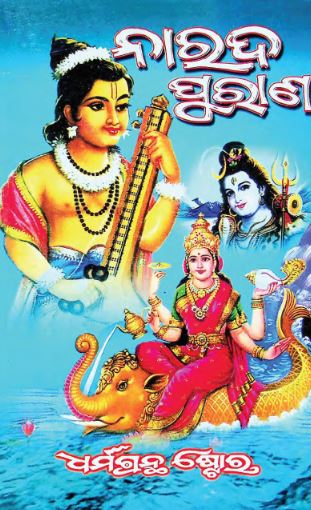Narada Purana is a significant text in Hindu mythology, and the Odia translation by Kshetra Mohan Pradhan in 2006 brings forth the rich cultural heritage and religious beliefs of the ancient scriptures. This book is a timeless treasure that provides insights into the intricate details of the Hindu pantheon, the stories of gods and goddesses, and the moral lessons that they impart.
One of the most prominent figures in the Narada Purana is Narada Muni himself, a celestial sage known for his musical talents and profound wisdom. His character serves as a narrative device to convey important teachings and moral values to the readers. Through his interactions with various deities and sages, Narada Muni guides the audience on a spiritual journey, highlighting the importance of devotion, righteousness, and karma.
The Narada Purana also delves into the significance of sacred rivers, with special emphasis on the river Ganga. The Ganga is revered as a goddess in Hindu mythology, and her purifying waters are believed to wash away sins and grant salvation to those who bathe in her. The book elaborates on the mythological origins of the Ganga and the rituals associated with her worship, emphasizing the spiritual connection between humans and nature.
Another important aspect of the Narada Purana is its retelling of the Bhagabata, one of the most revered Hindu scriptures. The Bhagabata narrates the story of Lord Krishna and his teachings to Arjuna on the battlefield of Kurukshetra, offering profound insights into the nature of reality, dharma, and the ultimate goal of life. By incorporating the Bhagabata into the Narada Purana, Byasadeba provides readers with a comprehensive understanding of Hindu philosophy and theology.
The Odia translation of the Narada Purana by Kshetra Mohan Pradhan is a valuable resource for scholars, students, and spiritual seekers alike. Pradhan’s meticulous attention to detail and his deep understanding of the text shine through in his translation, making this book accessible to a wider audience. The publication of this translation in 2006 marked a significant milestone in the dissemination of Odia literature and culture.
The Narada Purana also touches upon the concept of vows, known as ‘vratas’ in Hinduism. Vows are undertaken by devotees to express their commitment to a particular deity or to seek blessings for a specific purpose. The book outlines the various types of vows and the rituals associated with them, shedding light on the importance of faith and devotion in Hindu practice.
In addition to its theological and philosophical themes, the Narada Purana also includes colorful myths and legends, such as the tale of the dwarf incarnation of Vishnu. This story highlights the divine play of gods and goddesses, showcasing their compassion, valor, and wisdom. Byasadeba’s translation captures the beauty and complexity of these myths, offering readers a glimpse into the mystical world of Hindu mythology.
In conclusion, the Odia translation of the Narada Purana by Kshetra Mohan Pradhan is a masterful work that preserves the timeless wisdom of Hindu scriptures for future generations. This book is a testament to the rich cultural heritage of India and a source of inspiration for those seeking spiritual enlightenment. Byasadeba’s translation is a must-read for anyone interested in exploring the depths of Hindu mythology and philosophy.
Books Info
| Books name | Narada Purana/ନାରଦ ପୁରାଣ |
| Translated | Byasadeba; Kshetra Mohan Pradhan, . |
| No Of pages | 201 |
| Publisher | Dharma Grantha Store |
| Publication | 2006 np. |
| Printed At | NA |
| Distributor | NA |

